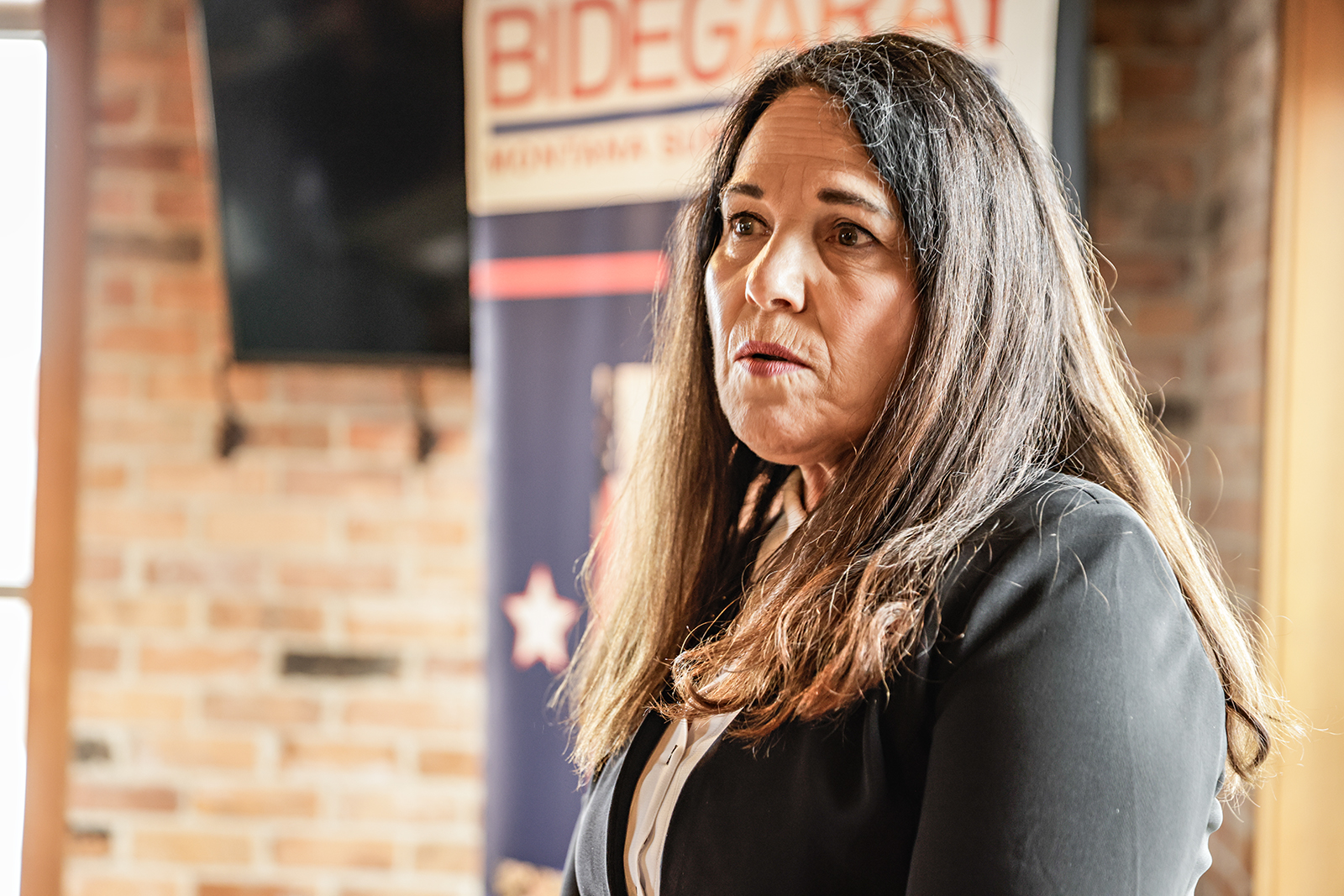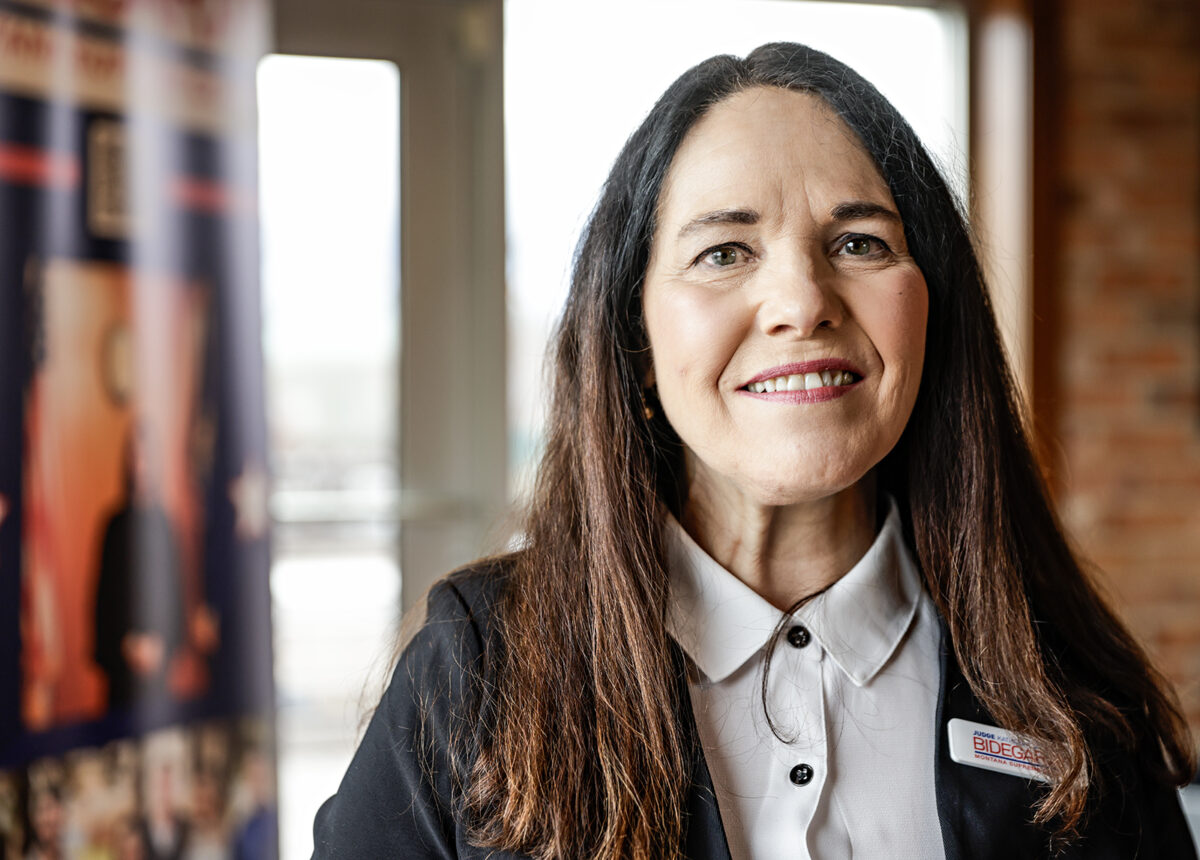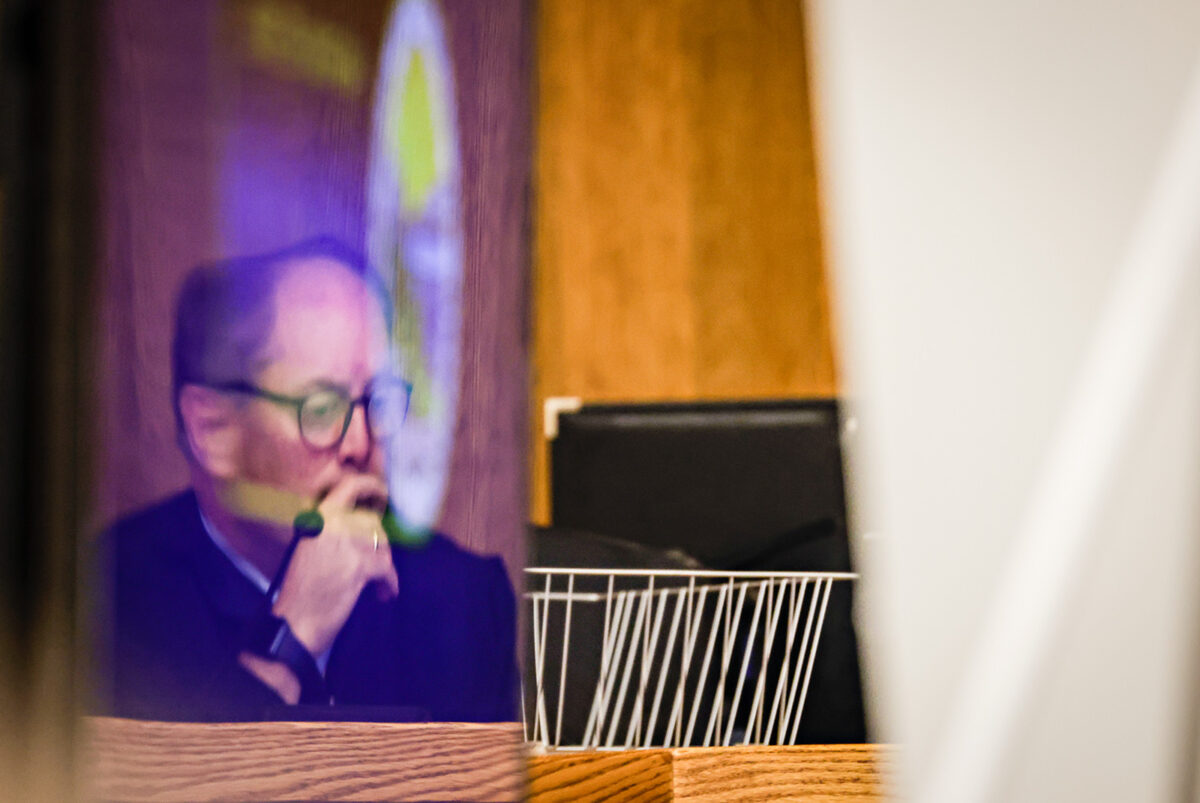Supreme Court Candidate Bidegaray Vows to Protect Constitutional Rights at Flathead Campaign Events
In Kalispell and Whitefish last week, the longtime district court judge pledged to uphold Montana’s Constitution and safeguard environmental, educational and women’s rights if elected to the state’s highest court.
By Denali Sagner
Montana Supreme Court candidate Katherine Bidegaray spoke to Kalispell Democrats and local attorneys last week, outlining her vision for a just and independent judiciary as she campaigns for a seat on the state’s highest court.
“We’re living in times of unprecedented attacks on our judiciary, on our rights, particularly women’s rights, and on the rule of law,” Bidegaray told a crowd of about 30 attendees at Bias Brewing on Thursday. “Now, more than ever, we need people at the Montana Supreme Court who have the backbone to stand up to these kinds of assaults.”
Bidegaray is a judge for Montana’s seventh judicial district, which covers eastern Montana’s Dawson, McCone, Prairie, Richland and Wibaux counties. A lifelong Montanan, Bidegaray has built her campaign around her record as a public service litigator and longtime judge who plans to defend Montana’s Constitution and non-partisan judiciary. During campaign stops in the Flathead last week, Bidegaray pitched voters on her judicial accolades while her supporters criticized Dan Wilson, a Flathead County district court judge and Bidegaray’s opponent in the Supreme Court race.
The child of Basque immigrants who fled the French Pyrnese Mountains after World War II, Bidegaray was raised in eastern Montana where her family raised livestock and farmed small grains. After graduating from high school in Culbertson, Bidegaray moved to Missoula, where she earned her bachelor’s and law degrees from the University of Montana.
Following law school, Bidegaray took a job as an insurance department staff attorney at the Montana State Auditor’s Office, then moving up to become the state’s deputy securities commissioner. She later moved back to eastern Montana where she represented clients in Montana and North Dakota in a private practice.
Bidegaray was elected to the seventh district court in 2002 and retained by voters in 2008 and 2014.
“I try always to act with independence, impartiality, integrity, reasonableness, fairness, while developing a good, strong knowledge of the law and applying it,” Bidegaray said of her tenure as a district court judge. “I have consistently, in doing my job, set aside my own personal opinions and personal preferences.”
Bidegaray warned attendees of attacks on the judiciary that threaten the Supreme Court’s historical independence.
Judicial races in Montana are nonpartisan, given rules in the Montana Code of Judicial Conduct that bar candidates from accepting endorsements from sitting politicians and offering their opinions on various political issues.
Lawmakers have pushed to undermine the judiciary’s independence in recent years, however, introducing legislation that would allow judges to run with partisan labels and do away with Supreme Court elections altogether.
The historic nonpartisanship of the state’s judiciary saw another challenge last year, when Republican politicians and interest groups backed the Republican president of the Public Service Commission James Brown during Brown’s run for the Supreme Court. The Montana GOP spent more on Brown’s race for the Supreme Court than it did on all of its legislative candidates in partisan races combined during the 2022 election cycle.
Speaking in support of Bidegaray, former Supreme Court Justice Mike Wheat warned voters of “the forces that are going to try and prevent [Bidegaray] from being on the court.”
“The Legislature and the executive branch is owned by the right, and the only thing that stands in the way of some of the legislation that they’ve been trying to pass is an independent judiciary,” Wheat said.

Statewide courts in recent years have blocked a number of bills passed by the state’s Republican legislators, citing constitutional violations. A Missoula judge in September temporarily blocked a ban on certain healthcare procedures for transgender minors, a bill that passed the 2023 Legislature with overwhelming Republican support. State judges have also enjoined or struck down restrictions on abortion, a ban on drag performances and laws curtailing voting access.
Wheat added, “These forces that want to take over the Supreme Court are not going to stop. They want to own the court. They want to own the state. They want to come in, and they want to exploit what they can out of our great state.”
Though both Wilson and Bidegaray are running as nonpartisan candidates, Wheat painted Wilson as beholden to right-wing interests and cozy with Republican leaders.
Though he cannot receive official endorsements from politicians, Wilson has received donations from Gov. Greg Gianforte, Lt. Gov. Kristen Juras, Kalispell Sen. Keith Regier, Kalispell Rep. Courtenay Sprunger, Great Falls Rep. Wendy McKamey and Billings Sen. Tom McGillvray, all of whom are Republicans.
Bidegaray has received donations from a number of attorneys and nonprofit leaders, as well as Democratic Bozeman Sen. Denise Hayman and Democratic Gallatin County Commissioner Jennifer Boyer.
“Think about it when you go into the voting booth and you’re making a decision about who’s the best person to be on the Supreme Court, [to] protect our constitutional interests,” Wheat said.

Bidegaray spoke explicitly about ensuring constitutionally protected rights for Montanans, such as the rights to privacy, equal public education, access to public lands and a “clean and healthful environment,” which are outlined in the state’s unique 1972 constitution. The judge also criticized attacks on “women’s rights,” signaling a desire to safeguard abortion access, which is protected in Montana under the 1999 state Supreme Court ruling Armstrong v. State, but has faced challenges from conservative lawmakers who hope to roll back access to the procedure.
Republicans on the right flank of the state’s party have lambasted the judiciary for “legislating from the bench,” accusing the state’s judges of purporting liberal values and interfering with the legislative process.
When asked about accusations of “judicial activism,” Bidegaray told the Beacon that the ability for judges to strike down laws is a critical form of “checks and balances.”
“It’s easy to call on them ‘left.’ It’s easy to call them ‘legislating from the bench,’” the judge said. “… If we were to make the judiciary partisan, we would no longer have the separation of powers … that would be autocracy.”
The high stakes have made Montana’s recent judicial races unprecedentedly expensive.
Between July and December of 2023, Bidegaray raised over $116,700. Wilson between April and December raised $58,950. He also took out a $10,200 personal loan and contributed $1,735 of his personal funds to the campaign.
Election Day is Nov. 5. For more information on registering to vote, contact the Flathead County Election Department.
Related Coverage:
Supreme Court Candidate Dan Wilson Tells Voters He is Devoted ‘to the Game’